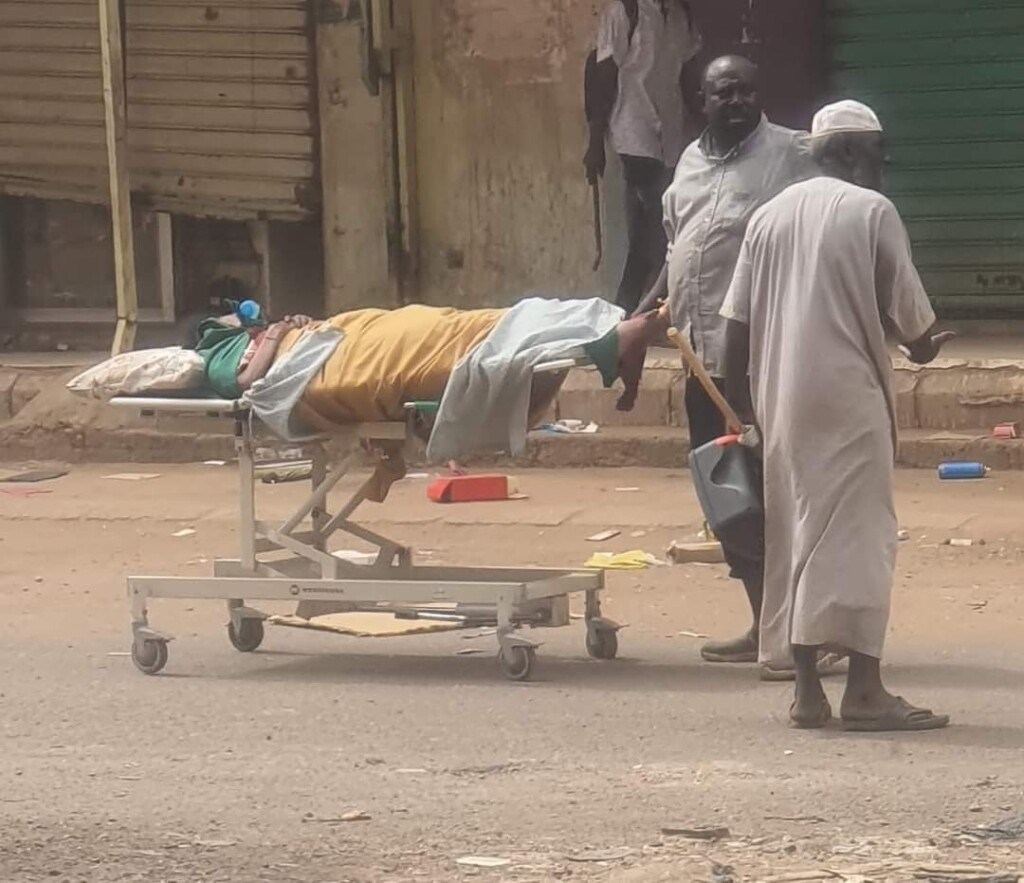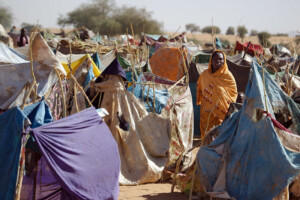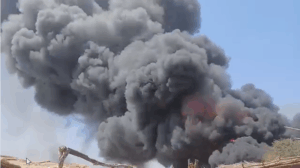Sudanese doctors face threats and repression as death toll mounts

Critically ill patients reportedly forced out on the streets from the Sharg El Neel hospital in Khartoum by the RSF last week (social media)
Khartoum – May 8, 2023
The number of civilians who died since the beginning of the clashes between the Sudanese Armed Forces (SAF) and the Rapid Support Forces (RSF), up until Saturday, was estimated to be 481 in a field report published by the Sudanese Doctors Union yesterday. Medical personnel highlighted the severe challenges and repression it faced at the hands of the warring parties.
The field report was based on data gathered up to Saturday, May 6, and also recorded 2,564 injuries.
In a separate statement on social media, the Sudanese Doctors Union confirmed that at least 60 hospitals are still unable to operate. Out of the 88 hospitals in and near ‘clash zones’, 60 are still out of service and the remaining 28 hospitals are threatened with closure due to the lack of staff and essential supplies.
Some only provide limited first aid services.
Within Khartoum, all but five hospitals are closed but these are operating “at least capacity and threatened to be closed”. The services at the El Razi University Hospital are labelled ‘unstable’ but the Hamida Children’s Hospital has services available.
The Turkish Hospital, Bashayer Teaching Hospital, and El Fouad hospital are able to provide emergency healthcare, orthopaedic surgery, kidney care (dialysis), and some general surgery. The latter is in urgent need of medical supplies and the teaching hospitals needs fuel.
The Children’s Teaching Hospital and the Specialised High Care Hospital in North Kordofan capital El Obeid were bombed and evacuated. El Obeid Teaching Hospital is open but medical supplies are urgently needed and El Daman Specialist Hospital re-opened its doors.
The Kassala Teaching Hospital, the New Halfa Hospital, and the Saudi Hospital for Women and Obstetrics in Kassala face acute oxygen shortages.
Five hospitals in El Fasher are closed.
In South Darfur, the Nyala Hospital is back in service.
Threats and repression
In two other statements, the doctors’ union confirmed its professional commitment in times of war, prioritising saving lives, and lamented the fact that medical staff are facing serious threats.
“Since the war broke out last April 15, thousands of doctors and medical staff all over Sudan have been working under extremely complex catastrophic conditions to save the wounded and injured civilians and military personnel. They remain committed to the values and traditions of the medical profession, and the protocols to be followed in situations of armed conflict, to continue to provide health and treatment services amidst a semi-complete collapse of the health sector, which has become a battlefield.”
‘Thousands of doctors and medical staff all over Sudan have been working under extremely complex catastrophic conditions’
They also stated that doctors from inside the preliminary committee of the doctors union and outside “have been exposed to clear threats that have reached the stage of threatening with physical violence over the phone or publicly on social media, as well as monitoring and tracking medical staff”.
“These threats, which coincide with a campaign by supporters of the defunct Al Bashir regime, clearly illustrate their desire to take revenge on doctors, who supported the glorious December Revolution. But we tell them that the revolution that terrified them is still going on and will continue until all its goals are achieved and the martyrs are avenged.”
“Since the outbreak of the armed conflict, the doctors and their unions are doing their job tirelessly and fearlessly.”
They explain that the international protocols and covenants to which they adhere “commit us in times of war to not make statements that could endanger the lives of working doctors, patients, and civilians seeking medical services and turn them into targets of parties to armed conflict. We commit to protect them under these laws”.
“We demand an immediate distinction of doctors with badges that facilitate a safe passage to their work sites, and the commitment of the armed forces and RSF to not assault them or the health facilities they work in,” one statement read.
Not only medical staff but also volunteers have faced threats and repression.
In a separate statement today, the Sudanese Doctors Union responded to claims by the SAF yesterday that two members of the resistance committees were arrested driving a ‘stolen ambulance’. The SAF accused them of “siding with the rebels”.
The doctors, however, said that the two people were members of a local first aid emergency room and were helping the Haj El Safi Hospital, which lacked drivers. The emergency room “has been doing great services” in cooperation with medical staff in Khartoum North (Khartoum Bahri) and the doctors union confirmed that the ambulance was not stolen but was working to evacuate the Haj El Safi Hospital, bringing patients to the Ahmed Gasim Hospital.
They demanded the immediate release of these young local volunteers, who have no connection to the RSF or the conflict in general.
Military presence
The Sudanese Doctors Union further rejected any armed military presence within civilian and medical institutions.
The military presence inside medical facilities or near its buildings, and the fact that they use them as platforms for shelling, forced hospitals to stop their medical services and turns them into a battlefield, which exposes medical personnel and patients to severe dangers, including death.
“We affirm our professionalism and justice in treating people. We receive and treat the wounded from the two conflicting parties as well, but we do not allow any of them to interfere in the medical professional decision.”
‘Armed military presence makes patients, our medical staff, and all volunteers in medical institutions vulnerable to the fire of conflict’
“Armed military presence makes patients, our medical staff, and all volunteers in medical institutions vulnerable to the fire of conflict, which leads to their evacuation and cessation of providing service. This happened several times during this absurd and damned war.”
The union calls on the conflicting parties not to have an armed presence in or near medical facilities and to respect the sanctity of hospitals and the dignity of patients and medical staff.
Prohibiting access
Not only the military presence in and near hospitals is preventing civilians from accessing healthcare. The Professional Pharmacists Association reported last Thursday that the RSF was deliberately preventing people from accessing the Central Medical Supplies Pharmacy.
“The Rapid Support Forces militia continues its criminal behaviour against unarmed civilians and their right to life and health service in repeated violation of international covenants and norms,” the association wrote.
“Not only do they terrorise residential neighbourhoods, take the civilian population as human shields, take health facilities as military barracks, and loot and destroy pharmacies, now they also prevent the staff of the Central Medical Supplies Pharmacy in Khartoum from providing services, which forced the pharmacy to close” on Wednesday.
The closure of the Central Medical Supplies Pharmacy is considered a “health catastrophe” by the association because the services it provides include providing life-saving medicines, blood pressure and diabetes medicines, and other essential medical devices and equipment, which is especially important in the current situation characterised by scarcity of supplies and difficulty of access everywhere.
“This step, in light of the scarcity of pharmaceutical service outlets, the lack of medicine supplies, and the people’s difficulty accessing care, is considered a full-fledged crime against unarmed civilians,” it wrote
“We of the Professional Pharmacists in the Association condemn this criminal behaviour of systematically attacking health service facilities in a brutal violation of the patients’ right to obtain their medicine.”
‘Preventing patients from accessing pharmaceutical service outlets is tantamount to a death sentence for different groups of patients’
“Preventing patients from accessing pharmaceutical service outlets is tantamount to a death sentence for different groups of patients, which amounts to crimes against humanity according to the Rome Statute [of the International Criminal Court].”











 and then
and then